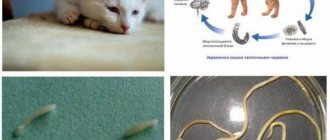Causes of bad breath in cats
If suddenly your pet opens its mouth, and from there comes the aroma of the Kraken’s mouth, then you urgently need to figure out why the cat has bad breath:
- Age: most often this attack occurs in young animals aged 1-3 years. If a “charming” amber is heard from an elderly cat, the cause is probably a disruption in the functioning of the internal organs.
- Changing baby teeth to permanent teeth: halitosis in kittens is quite rare, but it does happen during the period of teeth change.
- Oral diseases: gingivitis, caries, pharyngitis, stomatitis, cysts and other diseases often smell bad.
- Breed: Brachycephalic breeds (cats with a flattened face) also often cause their owners to suffer from bad breath.
- Problems with internal organs: diseased kidneys, liver, gastrointestinal tract, upper respiratory tract - any organ can betray its illness in this way.
- Inflammation: Any inflammation, from the lungs to an abscess in the oral cavity, can manifest itself as a stench.
- Helminths: as a result of the activity of bacteria, a cat’s mouth develops a bad odor.
Based on the above reasons, it becomes clear that the pet needs to be examined by a veterinarian.
When to contact a veterinarian
Be sure to seek advice from a specialist if the appearance of an unpleasant odor is accompanied by:
- an increase or decrease in temperature indicators;
- refusal of food;
- refusal of water;
- restless, anxious behavior;
- a sharp deterioration in the quality of coat and skin;
- intoxication of the body;
- problems with bowel movements and bladder emptying.
If an unpleasant odor emanates from a cat, it means that it is either not being properly cared for or the animal is sick. If hygiene standards are observed, it is better for owners to show their pet to a veterinarian, who will conduct a comprehensive examination, identify the factors that provoked the appearance of a “bad” odor and prescribe competent treatment.
Source
Treating cat bad breath
You should not listen carefully to the words of your cat-loving neighbor, who cured his purring dog’s mouth stench in some way. The causes of the problem can be completely different, so the first thing you should do is visit a veterinarian: after the appointment, it will be clear on what principle to treat the disease.
If the trouble was caused by an incorrect menu, then the first thing you need to do is balance your diet. The doctor will prescribe medications that will help eliminate the cause.
Problems with metabolism will be revealed by a blood, urine and stool test, as well as a swab of the oral mucosa. An additional symptom will be diarrhea in the cat or rare bowel movements. The diet will require the exclusion of economy-class feed and food from the host’s table.
If diabetes is suspected, it will require lifelong therapy and veterinary supervision.
If problems with internal organs or chronic diseases are indicated, an ultrasound scan or x-ray is taken.
Sometimes it is difficult to independently assess the condition of the oral cavity, so the cat is shown to a specialist: if periodontitis, tumors, caries, or excessively grown tartar are detected, qualified treatment methods will be taken.
How to remove odor from a cat's mouth
In the case where the cause of a cat’s bad breath is a disease of the cat’s mucous membrane or tartar, then you can cope on your own: brushes and gels can and should be purchased at the veterinary pharmacy that can and should be used to clean the cat’s teeth. It is better to accustom your pet to cleaning from childhood, but if the moment is missed, you will still have to start.
If the examination reveals wounds, then they must be regularly treated with miramistin or hydrogen peroxide 3%: after such simple steps, there is a chance that the cat will have much less bad breath if the cause is wounds or diseases of the oral cavity.
Remedies for cat bad breath
There are several remedies that can be used to help if your cat’s breath stinks.
Fresh Breath Tablets - Beafar company offers products containing chlorophyll. The medicine acts as a disinfectant on the mucous membranes of the mouth and is easily combined with food. The pet is given 2 tablets per day, one in the morning feeding, the second in the evening. The pack contains 40 tablets, the price of the medicine is about 500-800 rubles.
Another product with a lot of positive reviews is called Api-San spray or gel “Zubastic”. The medicine costs about 200-250 rubles. Instructions for use: apply the product only from the factory bottle 2-3 times a day for one or two weeks. Since the animal will experience profuse salivation in the first half hour, food is offered no earlier than 30 minutes after treatment.
Cliny Mouth Odor Control Spray is suitable for use on cats. The medication acts by destroying tartar, whitening teeth and strengthening gums. The stench that appears due to lack of oral hygiene is eliminated without harm to the animal’s health. You can spend about 200-250 rubles on the drug Cliny.
Gel Dentavedin is an anti-inflammatory and disinfectant for the care of the oral cavity in cats. By combating gram negative/positive bacteria, yeast and dermaphytes. The gel is rubbed into the gums and teeth. Feed the pussy only half an hour after the procedure. The cost of the drug is on average 70 rubles.
Timely care of the animal’s health will prevent the appearance of a bad odor from the pet’s mouth.
Odor control products
We'll tell you how to remove the smell left from cat urine using various means. Let's consider folk recipes and professional formulations with proven effectiveness.
Home Remedies
We have compiled the TOP 6 effective folk remedies for removing fresh and old stains, as well as removing the specific smell of marks and urine.
1. Vinegar. The universal composition is prepared from 1 part vinegar and 2 or 3 parts water - depending on the intensity of the unpleasant aroma. Wipe the contaminated area with the resulting liquid. After drying, you can apply baking soda to the treated area, which will neutralize the strong vinegar aroma. You can put the vinegar solution in a spray bottle: this way you can comfortably treat furniture, mattresses, and floor coverings.
2. Soda. This is an excellent product for removing fresh urine stains and marks. Sprinkle baking soda on the stained area and leave it for a while. If the recipe does not help, then pour a little 3% hydrogen peroxide solution on top of the scattered soda. After a few hours, wash the stained item or remove any remaining product from the surface with a wet cloth. The product is often used to clean upholstered furniture and mattresses.
3. Vodka. A cotton pad is moistened with an alcoholic drink or alcohol solution (1 part alcohol and 1 part water), and then wipe the stain with it. Movements should go from the edges to the center. In the case of old stains, leave a disc soaked in alcohol on the stained area for half an hour. The treated area should then dry naturally. Vodka is considered a universal recipe for different types of surfaces.
4. Citric acid. It will not only help get rid of the smell in the apartment, but also prevent the problem from occurring in the future. Cats do not like the aroma of citrus fruits, so most likely the animal will no longer mark or relieve itself in such a place. Universal recipe: juice of 1 lemon and 1 glass of water. The composition is suitable for linoleum, laminate, parquet, carpet, upholstered furniture.
5. Glycerin. Dissolves urea, which is considered the main source of unpleasant odor. Suitable for processing furniture, textiles, shoes. You need to apply a little glycerin from the pharmacy to the stained area or use soap containing glycerin. To enhance the effect, rub the contaminated area a little with a brush (for example, a soft toothbrush). The remaining foam is washed off with a damp sponge.
6. Iodine. Most often used for dark fabrics and floor coverings. 20 drops of iodine are dissolved in a liter of water and then applied to the stain. After 20-30 minutes, the treated area is washed with water at a temperature of about 30 degrees.
Lemon and peroxide have a brightening effect, so these products are not suitable for fabrics that fade.
If the cat has been actively marking or “missing” the toilet lately, then you can put lemon slices, jars of coffee, and chopped onions in the places where he did his tricks. These products can discourage your cat from making a new mark or staining the surface with urine.
Fetid and putrid odor from the mouth
Pleasant communication consists of a verbal component.
But in addition to words, on a subconscious level, a person evaluates his interlocutor by appearance, gestures and breath. More than a quarter of the world's population suffers from halitosis.
This is why most chewing gum advertisements are based on breath freshening. Indeed, menthol flavoring perfectly neutralizes putrid breath.
And clean breathing creates an attractive image of a person. An unpleasant odor can create problems in communication, cause discomfort and self-doubt; the extreme manifestation of this condition is depression.
It happens, of course, that a person exaggerates the problem and it seems to him that his breath is stale. With the so-called pseudohalitosis, a psychotherapist who will understand the causes of self-doubt helps a lot.
Aromatization of breath is a temporary effect. It’s good if the smell is barely noticeable or occurs very rarely. But persistent or regular bad breath is a cause for concern.
The first cause of the problem is usually dental disease. We will tell you in this article whether there are other predisposing factors.
Halitosis, why does it smell like that?
Halitosis (osostomia, pathological stomatodysonia) is the term used to describe putrid odor from the mouth. This smell is disgusting because it usually indicates that it contains toxic substances.
These may be rotting products or toxins formed as a result of the activity of pathogenic bacteria. Sometimes an unpleasant odor is caused by eating garlic or onions, or sauces containing them.
This is because these products contain large amounts of sulfur, which is known to smell bad, but is not a disease and is easily remedied.
The nature of the smell can be divided into 6 types:
- Rotten egg or hydrogen sulfide smell. This aroma may be a sign of digestive problems, especially if there are other complaints such as flatulence, dyspepsia, or a white coating on the back of the tongue.
- A sour smell, especially after eating, is a manifestation of the inflammatory process in the stomach.
- A putrid odor with a bitter taste in the mouth occurs when bile stagnates in the biliary tract. Pain in the right side and an unpleasant odor are reasons to consult a doctor.
- The smell of rotten apples, acetone and a sweet taste in the mouth occurs with diabetes; it is necessary to quickly be examined by an endocrinologist who will prescribe treatment.
- A sharp ammonia smell and taste of urea in the mouth occurs with severe pathology of the urinary system.
- Putrid odor from the mouth, the causes of which are inadequate cleaning of the teeth and tongue.
- An iodine aroma occurs with excessive consumption of this microelement.
Detect and neutralize
Furry pets love to mark their territory. Think great leather boots are yours? Not at all, your cat thinks completely differently. So don't be surprised if one morning you find an unpleasant surprise in your shoes. Cats can mark absolutely any part of the territory: carpets, sofas, chairs, floors, clothes, shoes, toys and other things of the owners.
Following cat psychology, not a single pet will make its surprises in front of its owner. After all, the cat understands that this will be followed by a very severe punishment. Therefore, very often the owners catch the “aroma”, but do not know how to discover the place of the “surprise”. If your sense of smell did not allow you to find the “marked” area in the apartment, use a black light lamp. Turn off all the lights in the apartment and turn on the lamp, first pointing it at possible affected areas. Traces of cat urine will appear as yellow spots in the dark.
Dental causes of stale amber
First of all, when troubled by an unpleasant odor, people turn to the dentist. Indeed, most of the population simply do not have proper oral hygiene skills.
Pieces of food stuck between teeth or in gum pockets begin to decompose over time, creating a characteristic aroma. Remains of rot in the mouth are a breeding ground for bacteria.
Children and teenagers face this problem because they do not have the habit of brushing their teeth after every meal, and also simply do not do it thoroughly enough.
Inflammatory processes are the source of bad breath. These include:
- gingivitis;
- periodontitis;
- stomatitis;
- periodontitis;
- glossitis;
- caries.
A predisposing factor for the development of these inflammatory processes is plaque on the teeth, tongue and tartar.
Food residues in dentures and tissue trauma due to improperly installed dentures contribute to inflammation and the proliferation of putrefactive microorganisms.
In addition, saliva plays an important role in cleaning the oral cavity. It not only contains enzymes to begin digestion, but also microelements for the mineralization of enamel tissue and substances that kill pathogenic microflora.
Diseases of the salivary glands, accompanied by a decrease and thickening of saliva, lead to the appearance of an unpleasant odor.
Dry mouth also happens if a person does not follow the drinking regime or often breathes through the nose; this is often observed in children with nasal congestion.
Old people experience natural atrophy of the cells of the mucous and salivary glands, so they often complain of dry mouth.
Nicotine and cigarette tar disrupt salivation, contribute to the appearance of erosions and ulcers of the oral cavity, and worsen the mineralization of enamel. This leads to the appearance of the characteristic smell of a smoking person.
At the appointment, the dentist will definitely diagnose all these conditions, prescribe treatment and give recommendations for prevention, so you should contact the dental clinic at least 2 times a year.
Halitosis in childhood
Parents often notice bad breath in their children. Normally, children's breath is free of foreign odors, but unpleasant ones will cause natural concern.
The main causes of halitosis in children coincide with the provoking factors in adults, these include the following:
- Teething is accompanied by damage and inflammation of the gums, so during this period it is necessary to monitor the cleanliness of the baby’s mouth.
- Insufficient drinking regime provokes indigestion, decreased saliva and dry mouth.
- Mental unrest and an unfavorable emotional background contribute to the drying out of the oral mucosa.
- An unbalanced diet, when fatty and salty foods predominate, contributes to digestive disorders.
- Children are more susceptible to nasopharyngeal diseases.
If you correctly teach your baby how to care for his mouth, this skill will continue to be present in adults.
Children themselves rarely pay attention to this problem, so parents should regularly bring their children for preventive medical examinations at the dentist.
How to deal with bad breath
Treating bad breath involves treating the underlying cause. Only a specialist can determine the provoking condition.
More than three-quarters of cases relate to poor hygiene and oral diseases, so contact your dentist promptly. He will prescribe treatment and recommend products for proper cleaning of the oral cavity.
It is advisable to thoroughly brush not only your teeth, but also the interdental spaces and tongue. Dental floss, tongue brushes and rinses will help with this.
You should take your choice of toothpaste seriously; choose fluoridated products only if recommended by your dentist. But what to do if you can’t get to the doctor today, but there is still bad breath.
The following tricks will help:
- Chew coffee beans for 3-4 minutes or eat instant coffee on the tip of a teaspoon;
- chew dill or parsley;
- use a mouthwash or a solution of triclosan and chlorhexidine.
A good anti-inflammatory and deodorizing effect will come from daily use of decoctions of chamomile, sage, oak bark, yarrow, preparations with propolis and tea tree extract.
If the problem of putrid breath is not related to dental diseases, then the dentist will recommend a specialist for further examination.
You may need to be examined by an otolaryngologist, gastroenterologist, endocrinologist or nephrologist. In any case, you should not delay contacting a doctor.
Halitosis is an unpleasant symptom, but it can and should be combated. Get examined, brush your teeth, eat right, don’t be afraid of dentists and you will become a pleasant conversationalist with fresh breath.
Useful materials:
- How to survive the death of a cat How to tell a child about the death of an animal? Pets - cats, dogs, parrots and hamsters live...
- The cat's nose turns black moderatorial ultrasound abscess vitamin deficiency aquarium acne allergy tests first aid kit pregnancy and childbirth rabies gastrointestinal diseases...
- A cat vomited a worm. What is the danger of having parasites in cats? Cats can get 2 types of parasitic worms: tapeworms and...
- How to rid a cat of what to treat? When diagnosing a helminthic infestation, the doctor will do tests and conduct a thorough examination to find out what kind of parasite...
Professional household chemicals
Specialized products designed taking into account the specific composition of cat urine and tags will help solve the problem. The most popular products include:
- Odor neutralizer in the form of a spray, Wellroom. Helps eliminate unwanted odors through enzymes that break down organic contaminants. The product will not just kill the smell of the cat, but will destroy the aroma at the molecular level. Effective for neutralizing marks and traces of urine, traces of excrement. It has a pleasant aroma of citrus and cinnamon.
- Nature's Miracle Cat Urine Odor Eliminator Spray. The enzyme-based product is suitable for all types of coatings and even eliminates the smell of feces. Discourages pets' interest in the treated area. Can be used as a spray or foam.
- Liquid odor eliminator Zoo Clean "DezoSan" . A universal concentrate eliminates stench of organic origin, on any surfaces and in the air. Contains no bleach, phosphates or fluorine. Has a deodorizing effect.
- Spray Urine-off Cat & Kitten. Hypoallergenic spray neutralizes the smell of pet urine and cleans any hard or soft surfaces. Copes with old stains. The anti-odor contains pheromone blockers, which help wean the cat from further marking.
- Concentrate SmellOFF. Suitable for getting rid of odors and destroying bacteria in the room. Contains neutral detergent components, natural plant extracts, enzymes. Apply with a spray bottle to those areas of the room that require cleaning.
To eliminate stains and quickly get rid of odors using professional products, strictly follow the manufacturer's instructions.











